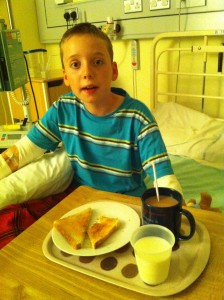Don’t do as we did…
June 17, 2012 | 8:38 pmNow you’ve all had a chance to see the DiabetesUK & JDRF UK Symptoms awareness video, I thought I’d share what happened to Sam in the months leading up to his diagnosis.
I wanted to wait until the video was out there because although we noticed some of the symptoms discussed in the video, Sam had others that aren’t mentioned in the video. The producers wanted to keep the videos message simple, which I can understand. In such a short film, you can end up saying to much and simply confusing the viewer. Maybe that’s whey we just never put two and two together, until he was really ill. Over the period of about 3 months, Sam changed a lot and we just kept putting it down to puberty.
As well as the excessive drinking, weeing & lethargy discussed in the video, Sam regularly got leg cramps in the night. had three separate vomiting episodes and lost about over a stone in weight. We thought the cramps were growing pains but with hindsight realised they were due to dehydration, as his body was trying to flush out his system.
The reason for all these symptoms was because Sam’s immune system had started to attack his pancreas, and was destroying the cells that produce insulin. Our bodies use insulin to take up glucose from the blood and store it in either the liver, muscles or fat. Without insulin, the carbohydrates in the food we eat cannot be used by the body and just float around in the blood as glucose.
When Sam’s body started destroying the cells that make insulin (the beta-cells), his body had to start looking elsewhere for glucose. Our muscles need the energy that comes from glucose to perform basic functions like breathing and walking, and Sam’s started getting his from the stored fats in his body. When we eat too much carbohydrate, our bodies store the excess as fats. The reverse happens when you starve the body, and Sam’s body was effectively being malnourished, because even though he was eating carbs, he couldn’t use them without insulin.
With children who develop type 1 diabetes, there is an added complication, which affects them long before the malnourishment will.
If you’ve ever heard of or even been on the Atkins diet, you will know about Ketones. These are produced by the body, as a by-product, when it uses fats as energy. The Atkins diet kit comes with test strips that you wee on, and if they turn green, you are producing ketones. You get to this point by removing carbs from your diet, so the body has to start burning fats for energy. In a pre-diabetic child much the same happens but on a much greater scale. A few ketones won’t harm you but ketones are acidic and too many are poisonous to the body. This is called Diabetic ketoacidosis (DKA for short) and it can be fatal.
By the time we found out Sam’s body wanted all this water to try and flush out the ketones, he was DKA and very ill. Looking back, it’s amazing to see how quickly all this happened.
This was Sam at the beginning of April 2010…
Sam was sick, vomiting for no reason, when we went to visit my mother-in-law at the beginning of April. He was fine the next morning so we put it down to over indulgence at the restaurant we visited the night before.
Five weeks later, we went to The Peak District for the weekend with the Scouts and here was the first time friends of mine commented… “Hasn’t Sam grown”! We all thought he was loosing a bit of his “puppy” fat as he started to grow skywards….
At a camping holiday a few weeks later on 25th June, more friends commented on how he’d grown. We noticed it too of course. With a few extra cm’s height and less weight on him, he looked a lot more mature.
As I write this, I remember that he was sick in his sleeping bag one of the nights we were there. He was fine the next morning though, so I think once again, we just put it down to something he ate.
He went camping with the Scouts a couple of weeks later and when we picked him up, he looked very tired. The leaders commented on how tired he’d been over the weekend and hadn’t got as involved with all the activities as usual. Again, we just put it down to something… In this case, the thought that he would have been awake all night talking in the tent with his friends as usual. There’s always a reason you can put these things down to, isn’t there!
Talking about this with my parents, nearly two years later, my mum mentioned that Nikki had commented once when we were all away together. “Sam is just not himself, but I don’t know what it is”. After our experience, I would say to anyone. If you aren’t sure, trust your instincts as a parent. Take them to the doctors. A simple blood glucose test can be done by a nurse in any surgery in seconds.
Less than six weeks later and Sam was in hospital…
He spent five days in hospital, partly as they got him well again on a couple of drips, but also as they taught us to start caring for a type 1 child. Whilst we were there, I recall one of the nurses trying to reassure us. “Don’t worry” she said, “This will be the sickest he’ll ever be with diabetes” referring to his DKA.
And so far, that has proved to be the case. We went on holiday to France four weeks later, and the turnaround in him was staggering…
By the end of August 2010 he was almost back to normal.
As I write this and we approach his second ‘D’-versary, he is managing remarkably well. His last four quarterly HbA1c tests have all been 6.something with the most recent his lowest to date at 6.1%. He has put all his weight back on and more, and is one of the tallest in his class at school.
This is most surprising as his father is only 5 ft 9″!!!
Posted by Gareth















This is so reminiscent of what we went through a couple of months back with my son (@sugar_boy_tom), although thankfully we didn’t get to the DKA stage. As parents we naturally try to put a positive angle on changes in our kids – our’s was Tom’s lethargy was him growing up and not being such a wappy boy. 3 months since his diagnosis, and we have our wappy boy back…and what a relief it is to see him!!
My mum is Type 2 diabetic, and I recall very clearly when she initially had symptoms…drinking and toilet stops…so when Tom started to drink and drink and drink some more I was alert to the symptoms – but still had to wait 5 days for a GP appointment to get his urine tested. Looking back I cannot believe this wait – and that I happily took it – I think I felt reassured that they weren’t in a rush to see him, and that maybe my home diagnosis was wrong!!
Now, although I hate this disease and what it makes these kids go through, I am learning to accept and work with it to keep my boy healthy.
Marian
Thanks for your comment Marian. I hope you and Tom are getting there with his care. Is he on a pump?
No we are injecting at the moment, although I do hope in the long term he will get a pump (assuming that is what he wants). We have been incredibly lucky to have a supportive school who have taken on his daily care under the guidance of us and our diabetes team. It all seems a bit hit and miss though, as we inject set doses with little regard for what he might be eating!
It’s interesting to read how similar the symptoms are. I was 20 and didn’t suffer vomiting, but most of the other symptoms you mention here. The cramps were unpleasant as was the tiredness, but myself and others explained them away as the “student lifestyle” taking its toll – I was away at Uni at the time. Thankfully my Mum knew something wasn’t right and packed me off to the Doc’s when I returned home to start my sandwich (work experience) year.
You’re absolutely right. Type 1 tends to affect young people, who are constantly changing. Don’t explain it away too easily as growing up. Look at what the peer group are doing if you’re not sure, and get a quick check done if you suspect diabetes. It’s easily done and can be life-enhancing.
Cheers for that. It’s only by getting people talking, telling others etc that we will raise awareness of the symptoms, and hopefully avoid other kids being hospitalised with DKA
Almost exactly the same situation arose with me as the one described by Sams parents.Difference is that at the time I was 59 years old and had never had a days illness in my life.I had all the symptoms as described and went twice to the doctor each time being dagnosed with a urinary infection for which was prescribed ever more powerful antibiotcs.Before the second visit I pleaded for a house call which was refused and I managed to drag myself into the surgery only to be given more antibiotcs.Twenty four hours later I was unconscious and was taken to hospital where I stayed for five days.I was discharged on the basis that I would never get my blood sugar levels stabilised because the available food was so poor and diabeteic unfriendly.
If I had lived alone I should have died.I well remember the incredible debilitation and I would have passed away very peacefully.
Because of this I have lost faith in the medical profession and manage the condition without their help.I lead a very active lifestyle and ride my horses almost daily. I monitor my blood sugar levels ongoing and match my insulin dosage with my food intake and exercise levels.I read food labels very carefully and it is fair to say I have never experienced a further problem with either low or high blood sugar levels.The internet has been a fantastic source of information.
I have not visited my Doctor since this happened 6 years ago and continue to be responsible for my own wellbeing.
If anyone would like to discuss this experience with me please email.
Sincerely,Mike Jackson.
Hi Mike,
Thanks for your comment.
So sorry to hear that you are Type 1 too and that you had such a traumatic diagnosis!
But well done on being so proactive and managing it yourself.
Even though you dont go to the doctors, do you regularly get your HbA1c checked?
Reagrds,
Gareth
Hi Gareth,
No idea what HbA1c is but will make a point of finding out.I just ensure that my blood sugar levels are always between 4.1 and 5.9 mm a reasonable time after meals.
If the doctors were unable to diagnose it in the first place and were unable to provide a decent diet even in hospital they are hardly likely to be much good at helping me with anything else.Thank goodness for the internet.
Keep in touch,
Mike.
Hi Mike,
HbA1c is a test usually done every 3 months in clinic and gives a sort of average of your Blood glucose levels over the last 12 weeks.
Your consultant should use it as a measure of how your control has been. If you’ve not been to your GP since diagnosis, it might be worth going once just to get referred to your Diabetes Clinic at your local hospital, as they are the ones who usually do this test.
Like you say, the internet is a very good place to find out info. Check out this link:
http://www.diabetes.co.uk/what-is-hba1c.html
Cheers,
Gareth
I totally take on board what you are saying but I just do not trust the medics when it comes to diabetes care.There is a report in todays Daily Mail about a lady who had been living with diabetes for 30 years who was admitted to Worcestershire Hospital and she died simply because they were too stupid to regognise the symptoms of low blood sugar and give her a gloucose tablet.There is probably more to it than that but you get the idea.I rather look after myself than rely on other people.
I agree with you to a certain extent. I definately think that the most important carer is the patient (or parent for Children with Diabetes) and they should take the most repsonsibility.
But I also think there are lots of very good health care professionals out there, who can help you to improve your own care. The trick can be finding them sometimes.
Our support at Bassetlaw Hospital has been first class, but I hear lots of scary tales from other parents on the Children with Diabetes forum, of some very poor care.
I think it’s important to remember that you can always change hospitals. If you don’t think your clinic is giving you good enough care, research who is better near you (or not so near) and get your doctor to refer you.
That is your right!